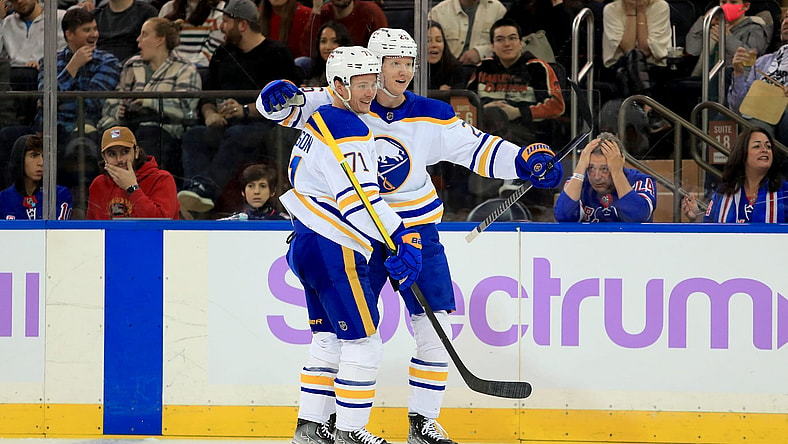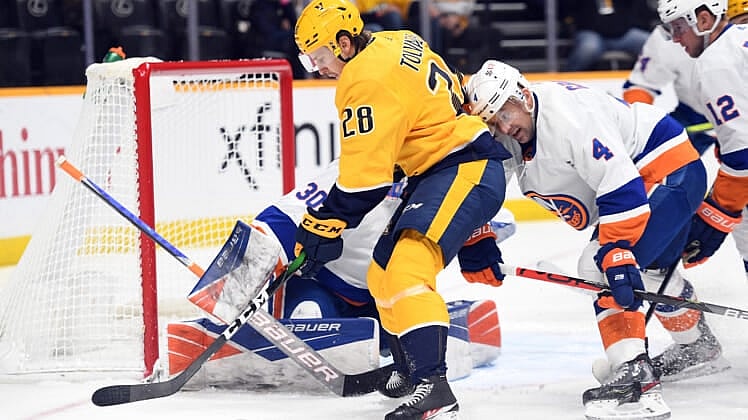
Ever since an NHL referee was terminated in March 2021 for getting caught on a hot mic talking about wanting to call a penalty against the Nashville Predators, game management in the NHL has become a hot topic of conversation among fans.
Penalties are often not called in the last minutes of game play in close games, and penalty calls are generally even on both sides of the scoreboard, with blatant calls missed and questionable calls leading to key players in the box, which results in game-tying or even game-winning goals.
Let’s not even consider the blatant misstep in officiating when the Toronto video review room overturned Victor Olofsson‘s game-tying goal in the last minute of the Buffalo Sabres’ contest against the New York Rangers in December. The video review office deemed it offside, overturning the good goal call that was made by the on-ice officiating crew. The goal was, in fact, a good goal, and not offside.
NHL referees under the microscope

But that’s one of the few times the NHL referees could be defended. In the New York Islanders’ second contest against the Nashville Predators this season, also in December, Eeli Tolvanen hooked and tripped Islanders forward Mathew Barzal in the last minutes of the game, which was tied 3-3. Barzal was in the offensive zone, buzzing and generating offense that could have resulted in a goal had he not been brought to the ground. The referees, however, opted not to call a penalty in the last minutes of a tied game.
The non-call gave Tolvanen the puck, which he then skated up the ice and put into the back of the net, giving the Nashville Predators the 4-3 victory. The problem, though, is that he should’ve been given a penalty the second he touched the puck, which means the goal wouldn’t have happened, and the Predators likely would not have won the game in regulation, meaning the Islanders would have gotten at least one precious point from the contest.
Game management by NHL referees has been talked about and called the root of the NHL’s issues since well before Peel’s dismissal, with TSN reporting on it as early as 2019. Travis Yost specifically called out “the five-minute major doled out to Cody Eakin of the Vegas Golden Knights in Round 1, which effectively decided the outcome of an entire series,” referring to a call made in the 2019 Stanley Cup playoffs.
“Michael Lopez’s seminal research clearly exhibited what he called “biased impartiality,” or an officiating team’s attempt at being perceived as fair above all else. Phil Birnbaum’s research showed similar results. This is critical, because it’s the one data point we have that suggests referees have more of an interest in balancing calls than getting the calls right. That is a foundational failure, and until it is fixed, you will always have quality criticisms,” Yost continues.
There are many debates and suggestions around how to fix NHL referees’ game management, however nothing has come of the conversations that have allegedly been happening since the summer of 2019. As it stands, the NHL referees are calling the game equally, doling out roughly the same amount of calls to each side, instead of calling it fairly, which is angering fans and leading to many unfair calls and wins in the league for years.
Beyond fans, players and coaching staff are questioning why game management, judged by NHL referees, exists.
“I think if you look at every sport, we’re probably the only sport really where games are managed. It’s a tough job, those guys are in a tough spot. That’s the biggest thing every player wants. We want consistency. If you’re calling penalties consistently or if you’re letting guys play I think that’s what guys want. I don’t think they want it to change from game to game, you want consistency night in night out.”
Philadelphia Flyers forward Nate Thompson, via Sportsnet
The Seattle Times wrote a similar piece criticizing the NHL referees, and TSN analyst Gord Miller called out the NHL as a whole for game management. The players will adjust, he noted, and it seems logical. Guys will stop doing penalty-worthy things if they know every misstep will be penalized. Penalties, logically, will happen less if players know they can’t get away with things for the sake of equality and the appearance of impartiality.
It’s more fun for the fans of both teams to watch a game where they know everything is going to be called, where NHL referees are not deciding fates based on arbitrary equality, where players are not disadvantaged by the amount of calls already made in a game. The game, in its purest form, is what fans come here to enjoy, not for what the NHL referees deem as fair or equal.
The game should be played and officiated fairly and consistently, and not equally, across every contest. It makes for a better game, and, evidently, many have been asking for it for years. Let the players decide whether or not they want to take a penalty–it’s what the game deserves.